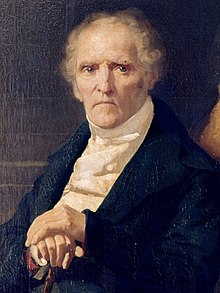
Back Charles Fourier AN شارل فورييه Arabic شارل فورييه ARZ Şarl Furye Azerbaijani Шарль Фур’е Byelorussian Шарл Фурие Bulgarian Charles Fourier BS Charles Fourier Catalan شارل فووریێ CKB Charles Fourier Czech
Charles Fourier | |
|---|---|
 Portrait by Jean Gigoux, 1835 (detail) | |
| Born | François Marie Charles Fourier 7 April 1772 |
| Died | 10 October 1837 (aged 65) |
| Era | 19th-century philosophy |
| Region | Western philosophy |
| School | Utopian socialism Fourierism |
Main interests | Political philosophy Economics Philosophy of desire |
Notable ideas | Phalanstère "Attractive work" Coining the term feminism Critique of work |
| Part of a series on |
| Socialism |
|---|
 |
François Marie Charles Fourier (/ˈfʊrieɪ, -iər/;[1] French: [ʃaʁl fuʁje]; 7 April 1772 – 10 October 1837) was a French philosopher, an influential early socialist thinker, and one of the founders of utopian socialism.[2] Some of his views, held to be radical in his lifetime, have become mainstream in modern society. For instance, Fourier is credited with having originated the word feminism in 1837.[3]
Fourier's social views and proposals inspired a whole movement of intentional communities. Among them in the United States were the community of Utopia, Ohio; La Reunion near present-day Dallas, Texas; Lake Zurich, Illinois; the North American Phalanx in Red Bank, New Jersey; Brook Farm in West Roxbury, Massachusetts; the Community Place and Sodus Bay Phalanx in New York State; Silkville, Kansas, and several others. In Guise, France, he influenced the Familistery of Guise. Fourier later inspired a diverse array of revolutionary thinkers and writers.
- ^ "Fourier". Dictionary.com Unabridged (Online). n.d.
- ^ Beecher, Jonathan (2022), van der Linden, Marcel (ed.), "Charles Fourier and Fourierism", The Cambridge History of Socialism, vol. 1, Cambridge University Press, pp. 167–187, ISBN 978-1-108-48134-2
- ^ Goldstein 1982, p. 92.